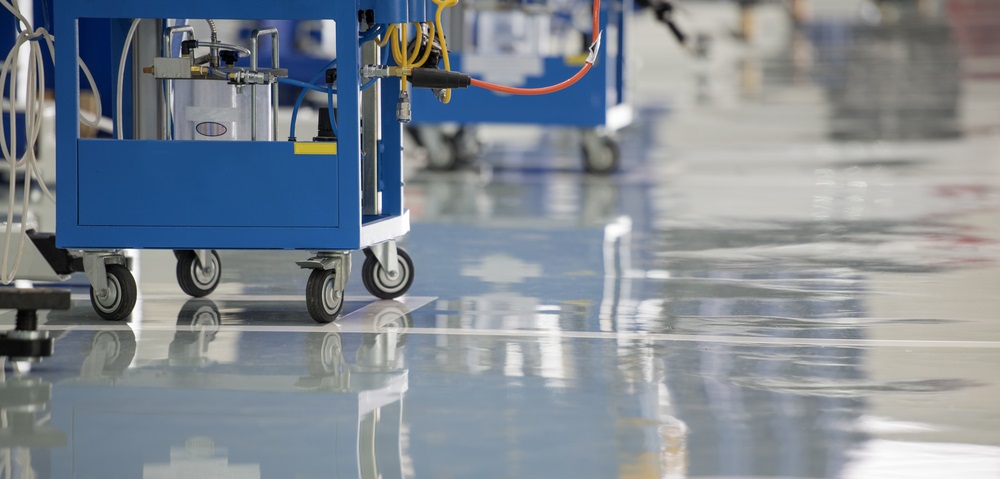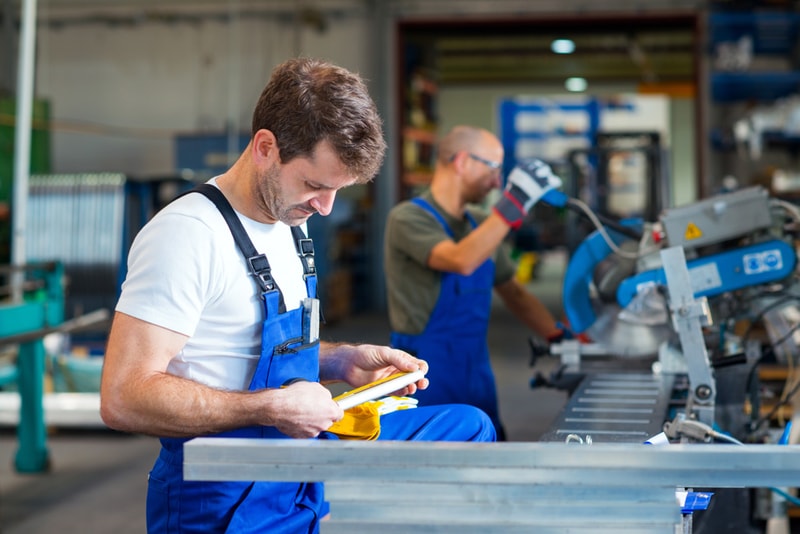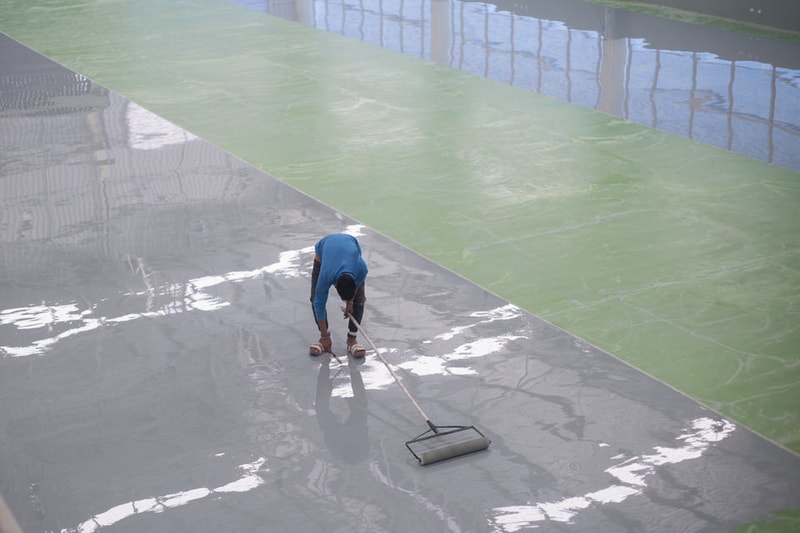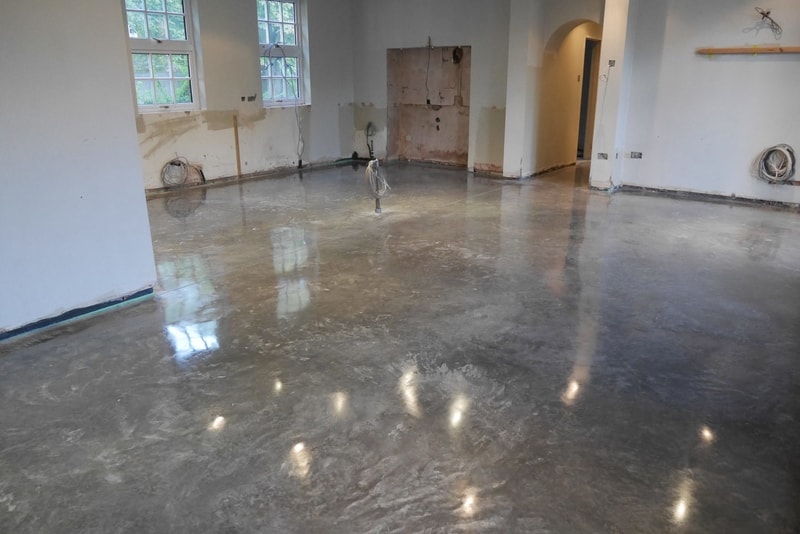
There are many different types of industry, each with a different type of flooring need. The different industrial flooring options for various uses can be tailored to meet unique demands. Industrial flooring differs from commercial flooring because it is mainly utilized in a manufacturing setting. The options have to stand up to medium to heavy equipment and constant traffic. This requires a level of safety and durability that residential or even most commercial flooring doesn’t need.
Therefore, before making your choice as to which type of flooring is the ideal one for your industrial building, you will need to compare the different options.
Considerations When Deciding on The Right Type of Flooring

The floor is exposed to constant stress each and every single day, and it’s very important to combine that knowledge with the advantages and disadvantages of each different option.
- Type and amount of traffic: If you’re talking about a space where trucks and cars will be driving over, you naturally need something that can handle the weight that those will require. Retails space does not have forklifts driving on top of it every single day, and foot traffic won’t cause the same wear as a forklift will, for instance.
- Foot traffic: If foot traffic is your main concern, you can choose an option that goes better with that. It could be one that is more gentle to walk on than concrete is.
- Color of the floor: If there are regular spills, you want to keep something where stains won’t be too visible and difficult to clean. While white floors may be visually appealing, the wear might simply show sooner. You should also choose a color that won’t be so flashy that you get tired from it a day after it has been installed. Light grey is a very safe option that no one will complain about, and it’s decently good at hiding stains too. If you’re handling products that could spill easily, consider choosing the same color as what would often be spilled and it will be a lot less obvious when it does happen.
- Temperature: If you are talking about the flooring in a freezer, you will not want it to be the same as the flooring on a manufacturing floor. It needs to work with the temperature that will be in the room it’s being laid in.
- Consider maintenance costs: All floors will need a certain amount of maintenance, and ones that are exposed to heavy machinery and other types of extreme wear will undoubtedly mean you need to spend money on maintenance.
Industrial Flooring Options
When considering flooring options these are your five best ones if you ask us. Your business may have certain specific requirements that would make something else a better option, but this is at least a good starting point.
Epoxy:

For most industrial applications epoxy flooring is often the best option. Epoxy flooring is composed of two different liquids that when combined harden to form a substance that resists damage and can stand up to almost all industrial uses.
Advantages of Epoxy
One of the advantages of epoxy is its range of different stains and color options that can leave you with the floor looking exactly the way you wish for it to look – highly customizable and with many different types of finishes.
Epoxy flooring is stain resistant, slip resistant and is highly resistant to bacterial growth. Different additives can be used during the pouring process for looks or function depending on the needs of the business.
The maintenance required for this type of flooring is also minimal, and when you factor in the life-costs of the floor, it becomes a very price-competitive option. Waxing or buffing isn’t necessary with this type of floor, as a normal mop and some standard cleaner will get rid of spills.
There’s a reason why epoxy is so widely used in industrial settings, simply because of its ability to withstand both forklifts and foot traffic.
You will often end up paying somewhere between $4 and $8 per square-foot, meaning your total installation cost for a 5,000 square-foot place will be between$20,000 and $40,000. However, remember that you’re saving on maintenance.
If you are ready to get quotes for the installation of this type of floor, you should use our website to get quotes from competing epoxy contractors.
Disadvantages of Epoxy
This type of flooring needs to be professionally installed to ensure that the installation has the quality needed to avoid early deterioration of the coating. It’s also a type of floor that takes some time to install, all depending on how thick a layer of epoxy you’re getting installed. Before you can install an additional layer of it, it must have sufficient time to dry completely.
Epoxy is often very slippery when it’s wet which is why you may need to add additional treatment to the make it less so, and you will also eventually need to put down a new layer of epoxy to keep it looking good, and when you start noticing coat peeling off, you will have to take measures to have it repaired.
When all has been said, it’s still an extremely popular flooring option for industrial purposes.
Polished Concrete:

While not the best option, concrete is one of the easiest options to use for large scale applications. For massive structures epoxy can be prohibitively expensive, as well as difficult to put into place. Unfinished concrete is less useful for many reasons. Unfinished concrete creates dust, stains easily, and can harbor bacteria. The better option is polishing the concrete. The polishing creates a floor that is relatively impermeable. Due to this impermeability, highly polished concrete is a choice that can be used in many industrial settings.
Advantages of Polished Concrete
Polished concrete is resistant to moisture, stains, and bacteria.
It’s a great option for those wishing to get a no-wax option due to the continuous advancements in our ability to polish and treat concrete surfaces and getting a high-gloss finish without using epoxy. Where epoxy is a fluid that’s applied on top, the polishing of the concrete is done with several rounds of polishing of the concrete, going finer and finer every time.
The floor is good for areas with light or medium wear, an will be a low-cost solution to have installed there.
Disadvantages of Polished Concrete
Although it can be beautiful, it has its fair share if disadvantages that include not being ideal if harsh chemicals are present and risk getting spilled, or food or packaging is something that the space is generally used for.
You need to remember that it is simply concrete that has been polished with no protective layer on top of it, which limits its strength and adds to its risk of getting damaged. Because of this, it will need to be re-polished, and your operations surrounding that need to be ready to accommodate it since it will require moving all the things currently on the floor, and not all industrial settings may be set up in a way that this is an option.
If your concrete floor is in a bad condition, polishing polishing isn’t ideal either.
Industrial Rubber Tile:
Industrial rubber flooring is an option that can be used in different settings. Normally this option is installed in large tiles. One of the benefits of rubber tiles is that rubber is softer to walk on and is an option that provides some insulation and protection to the flooring below.
Benefits of Industrial Rubber Tile
Industrial rubber tile has many advantages, although you won’t want to use it where big trucks are driving day in and day out. First of all, it’s recyclable and easy to maintain.
They’re also great in not staining easily, and chemical spills aren’t likely to show if addressed when they happen. You won’t see the scratch marks because they aren’t easy to scratch and even if they do scratch, the uneven surfaces will make the scratches less noticeable.
It’s also PVC free, and if people need to do a lot of walking, this floor will tire them out less than others would, and it absorbs sound too from being made of rubber.
Disadvantages
While it’s great to walk on, one of the disadvantages is that it can be more costly than other alternatives, and even become as expensive as types of high-end flooring.
Since it has seams, it can be less than ideal if large amounts of water are spilled on it regularly, since that can then get into the subfloor.
Vinyl

The cheapest option, vinyl flooring is moisture resistant and can easily cover large spaces. Vinyl can be found in wide rolls limiting joints that can prove a problem for keeping a place clean.
Advantages
The price tag is one you can’t complain about with vinyl, and it’s easy to maintain also. It’s pretty easy to install and the many options available with vinyl has made it an extremely popular option.
Disadvantages
While the cheapest option vinyl is also the least durable. It is susceptible to damage, wear, and tearing. In an industrial setting this moves it to the bottom of the list of your available options.
If you have sharp objects, these are not good to drag along a vinyl floor, as it will start ripping it up very quickly, as well as the requirement that the space where vinyl is applied is smooth upon installation. As mentioned the rolls come in different widths, but there’s the chance the the seams are visible.
Wood block:
One of the eco-friendlier options is end block wood flooring. While this is not practical for large scale industrial use, for smaller industrial spaces it can be a unique option. End block wood pieces are combined into a flooring that provides a softer surface. Wood lessens vibrations and provides fairly good insulation. The flooring is easily repairable by replacing blocks that are damaged.
Final Thoughts:
When determining what the best option is, do your best to consider the type of floor that will best suit your needs. Heavy machinery needs different flooring than that mainly used for people walking. If you transport your products within the facility with forklifts you require a different flooring than if your industrial use is making chemical products.